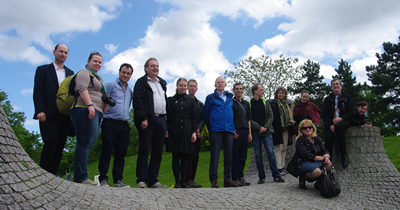
Report of the 20th meeting of the Panel on Invasive Alien Plants
Paris, 2015-05-05/07
The 20th meeting of the Panel on Invasive Alien Plants took place at the EPPO headquarters in Paris (FR) between 2015-05-05/07.

Ms Linnamägi presented an update on the new EU Regulation (1143/2014) on invasive alien species which was adopted last autumn and came into force on 2015-01-01. Mr Buholzer (Switzerland), Ms Mironova (Russian Federation) and Ms Marisavljevic (Serbia) presented updates on invasive alien plants from their countries.
The Pest Risk Analyses for Microstegium vimineum, Myriophyllum heterophyllum and Alternanthera philoxeroides which had been reviewed during EPPO Expert Working Groups will be presented to the next Working Party on Phytosanitary Regulations. Additionally, Mr Starfinger presented the national (German) PRA on Taraxacum koksaghyz – a species used for rubber production. The PM9 on Parthenium hysterophorus was also reviewed and finalised by the Panel; this will now be presented to the Working Party on Phytosanitary Regulations.
The Panel considered that two Ambrosia species, Ambrosia confertiflora and Ambrosia trifida, should be the next invasive alien plants for which a PRA and an EPPO Expert Working Group should be organised in 2015/16.
The Panel discussed the inclusion of five species to the EPPO Alert List
- Cenchrus longispinus: it was discussed that there has been a lot of confusion on the identification of this species in the past. The species is present in Belgium (casual), Croatia, France, Greece, Hungary, Iran, Israel, Italy, Morocco, Romania, Ukraine. The Panel agreed that this species should be added to the Alert List.
- Impatiens edgeworthii: although the species may be beneficial to bees the plant has been shown to outcompete native vegetation. The Panel agreed that this species should be added to the Alert List.
- Galenia pubescens: present in Israel and Spain, this species has been shown to form extensive mats in coastal regions in Spain where it has negative impacts on native biodiversity and ecosystem services. The Panel agreed that this species should be added to the Alert List.
- Landoltia punctata: the Panel considered that this species, although often observed as a contaminant of aquatic plants in trade, is of low risk to the EPPO region at present there are no observed impacts. The Panel decided that this species should be included in the EPPO List of other documented plant species.
- Pontederia cordata: the Panel thought that this species presents a low risk within the EPPO region and highlighted that the species is popular within the horticulture trade. The Panel decided that this species should be included in the EPPO List of other documented plant species.
It is proposed that the next Panel meeting will be held in Turkey on 2016-06-01/03.
